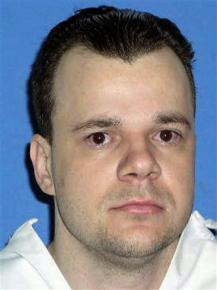Celebrating a victory in Texas
reports on a victory over the Texas execution machine.
A LAST-minute ruling by a federal judge stopped the execution of a Texas man who was scheduled to be put to death August 21, despite the fact that no one, not even prosecutors, says he killed someone.
The day before, the Texas Board of Pardons and Paroles had voted unanimously against clemency for death row prisoner Jeff Wood. Without a recommendation from the board, Gov. Rick Perry was legally barred from commuting Jeff's sentence--as he did one year earlier in the case of Kenneth Foster Jr., another man sent to death row who was never accused of killing someone. The odds that Jeff would be executed that Thursday evening appeared all but insurmountable.
The board's 7-0 vote against clemency came as a slap in the face to Jeff's family and those who had spent much of the summer organizing around the case. Following two rallies in San Antonio and Austin, as well as extensive media coverage and editorial support, many Texans had become familiar with the case.
It was remarkably similar to Kenneth Foster's. Both men had been sent to death row because they sat in a car while another man committed a murder. In 1996, Jeff had been coerced into cooperating with a gas station robbery, during which Daniel Reneau shot and killed Kriss Keeran.

It appeared that Texas would use its draconian Law of Parties--which allows prosecutors to charge defendants for murders committed by others--and ignore a steady stream of clemency letters and petition signatures demanding that the Lone Star State not kill a man for being in the wrong place at the wrong time.
But by the afternoon of August 21, the Wood family and their supporters had a reason to celebrate. With only hours to go before the grisly Texan ritual of execution was poised to unfold, Federal District Judge Orlando Luis Garcia issued a stay of execution. When the prosecution announced they wouldn't appeal the stay, it became clear there would be no execution in Texas that Thursday night.
GARCIA'S ORDER came because of another important issue underlying the Wood case. In addition to being factually innocent of murder, Jeff suffers from severe mental disabilities stemming from a lifetime of physical and psychological abuse. For example, during his trial, Jeff refused to cooperate with his court-appointed lawyers. He continues to believe that he is the victim of a Freemason conspiracy and has attempted suicide several times behind bars.
However, at every turn, the state has not only ignored such troubling facts, but even exploited Jeff's mental state to secure a confession following his arrest.
In a stinging decision, Judge Garcia wrote that Jeff's comments and conduct "at least arguably suggest the petitioner lacks a rational understanding of the causal link between his role in his criminal offense and the reason he has been sentenced to death."
Garcia chastised Texas courts for failing to hire mental health experts or a lawyer to help determine if Jeff's execution would have violated the U.S. Supreme Court ruling against executing people who are incapable of understanding the charges against them. "A system which requires an insane person to first make a 'substantial showing' of his own lack of mental capacity without the assistance of counsel or a mental health expert, in order to obtain such assistance is, by definition, an insane system," Garcia wrote.
Though a stay is obviously welcome news for the Wood family and their supporters, it is only temporary. The psychological experts who will now evaluate Jeff may very well determine that he is mentally fit to understand why he is facing execution.
The decision also does nothing to question the underlying logic of the Law of Parties. As far as the court is concerned, it is perfectly fine to execute someone for another person's crime--provided they are of sufficiently sound mind.
Last week's stay of execution, in other words, highlights what abolitionists have long understood about fighting the death penalty. Decisions by governors and judges represent important inroads toward abolishing the death penalty. The past several years have highlighted that all levels of government are treading more lightly when it comes to state killing.
However, the prospects for total abolition depend on the ability of a strong anti-death penalty movement to link capital punishment to broader struggles against a racist system that is broken to its very core.
Neither Jeff Wood nor Kenneth Foster would be alive today if not for the decades-old struggle against state killing that has helped to create a political environment where it is increasingly difficult for the state to kill its citizens in the name of justice.
Judge Garcia has given Jeff Wood and his supporters a window to continue organizing against a potential new execution date--and abolitionists everywhere one more reason to be confident that the death penalty has been pushed on the defensive across the U.S.


